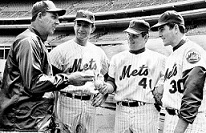It was early April. The rosters were set and Opening Day was hours away. Unexpectedly the Mets exhibition game against the Expos was cancelled due to a players strike. With a free afternoon and nothing to do, the Mets manager and some of his coaches decided to walk across the street and play a round of golf at the Palm Beach Lakes Club. Later that afternoon on their way back to the Ramada Hotel where the team was staying, manager Gil Hodges collapsed in the parking lot of a heart attack just 2 days prior to his 48th birthday. He was pronounced dead at 5:45 pm.
The emptiness left by Hodges’ passing was not just felt from Florida to Brooklyn and Flushing but throughout the entire Baseball community. One of the games most loved and respected players would never again walk onto the field.
Hodges career was worthy of enshrinement in Cooperstown. Over 18 years, two of which were interrupted by service to his co
untry in World War II, he compiled 1274 RBI’s, 14 Grand Slams (most in NL history at the time of his retirement) and 370 career HR’s (most by a RH hitter at the time.) He accrued 1921 hits and a respectable 273 career average for a power hitter to go along with a 487 slugging percentage. He was an 8 time All-Star, winner of 3 Gold Gloves and 3 World Series rings. On August 31, 1950, he hit 4 HR’s in 1 game and for 7 consecutive years, from 1949-1955, Hodges surpassed the century mark in RBI’s.

But it was Hodges ‘the man’ and not Hodges ‘the ballplayer’ that left his indelible mark on our national pastime. During his 15 year tenure with the Brooklyn Dodgers he was perhaps the most lovable of all ‘Dem Bums.’ Pitcher Clem Labine stated, “Gil was the only player I remember whom the fans never booed.’ Pee Wee Reese once said of his teammate, “If you had a son, you’d want him to grow up to be just like Gil Hodges.”
At the end of his stellar career, with his best days behind him, the city that loved him welcomed him home with open arms. 38 year old Hodges was the opening day 1bman for the expansion New York Mets and proceeded to hit the 1st round tripper in team history.
In 63, Hodges was traded to the hapless Senators where it had been decided he’d become their manager. Although Washington failed to ever reach .500 with Hodges at the helm, their win total improved each season. In 1968, the beloved Brooklyn Dodger and original Met returned to New York once more, this time to manage the lovable losers. Through the first 6 years of existence, New York’s ‘other’ team averaged 109 losses. However, when Gil took the reins, he immediately made it clear losing would not be tolerated.
As Buddy Harrelson stated, that first season Gil just watched, watched and studied. There was a lot more right with the Mets than wrong. He also made it clear to the press that he would not tolerate any jokes about ‘the same old Mets.’ He would go on to manage the Mets to 339 victories, 3rd most in club history.
 Gil’s larger than life persona and reputation commanded the respect of a young team. An ex-Marine, he was tough yet compassionate. He was paternal in nature to the young players. He was old-school. When he argued with umpires, they were not tantrums in the likes of an Earl Weaver or Lou Piniella, but rather logical discussions based on reasoning. He was nicknamed ‘The Quiet Man.’ When he was furious with a left fielder for not hustling, he had no qualms about walking across the diamond and personally escorting Cleon Jones from the game. “Gil remains the most important influence in my career because he told me what being a professional entails,” Tom Seaver once stated. Hodges went on to explain to the young pitching superstar, “Sometimes you don’t have your best stuff because you can’t control that. But you can always control your effort.”
Gil’s larger than life persona and reputation commanded the respect of a young team. An ex-Marine, he was tough yet compassionate. He was paternal in nature to the young players. He was old-school. When he argued with umpires, they were not tantrums in the likes of an Earl Weaver or Lou Piniella, but rather logical discussions based on reasoning. He was nicknamed ‘The Quiet Man.’ When he was furious with a left fielder for not hustling, he had no qualms about walking across the diamond and personally escorting Cleon Jones from the game. “Gil remains the most important influence in my career because he told me what being a professional entails,” Tom Seaver once stated. Hodges went on to explain to the young pitching superstar, “Sometimes you don’t have your best stuff because you can’t control that. But you can always control your effort.”
Hodges never displayed emotion, always appearing calm. No matter what happened on the field, good or bad, it appeared as if it was just as he planned. He was ahead of his time, becoming one of the first managers to platoon players. In 1969, he used the platoon of Swoboda and Shamsky in right, Weis and Boswell at 2b.
During the funeral service in April 1972, Gil’s son, Gil Hodges Jr, who was a prospect in the Cardinals organization, was ushered into the back of a limo by sportscaster Howard Cosell. In the rear seat sat Jackie and Rachel Robinson. “Jackie was hysterical,” recalled the younger Hodges. “My dad and mom were really the ones that befriended Jackie and Rachel. Mom made sure that the other wives” welcomed Rachel to the baseball family.
Every year the BBWAA elects someone worthy of baseball immortality to Cooperstown. And every year Hodges’ is seemingly forgotten, thus beginning a discussion/debate over why he continues to be overlooked. Perhaps, however, it’s his son, who sums it up best. Gil Hodges Jr, now in his sixties, was recently asked about his dad being passed over year in and year out. His response: “To me, in all honesty, it’s really beyond irrelevant. Everyone treats him like he’s in the Hall of Fame anyway.”
Gilbert Ray Hodges: April 4, 1924-April 2, 1972











